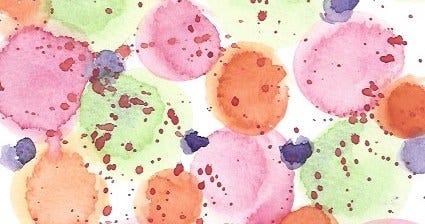What helps you focus in the bigger picture and in the flow zone itself?
Everyone talks about time management, but what’s really required for your creative work is focus management.
When you harness your focus, you create a container for the deep flow state to thrive. You temporarily fend off your other obligations to dive in deep with your artist.
Consider how you move between tasks, roles and projects. How easily can you release your thoughts about other obligations and drop into a focused state? Assess your focus ability on a scale of 1-10.
Getting better at this skill will make the biggest difference in your creative satisfaction. This will require some training. The quality of your focus will determine the quality of your creativity.
Big picture focus
There’s focus in the big picture. Having a lot of commitments splinters our attention. We’re constantly jumping from one thing to another. We have an unlimited sense of space and possibility in our minds. Our calendars tell a different story.
When I start to feel overwhelmed, I make a mindmap or list of all the things I have on my plate. I itemize both personal and professional obligations. This goes back to the Mindmap Your Plate exercise we did at the beginning. Getting my commitments out of my head helps me recognize my capacity. It also helps me to not add more.
One of my clients, Laurie Blasko realized something about boundaries and her focus. “By setting shiny new writing projects aside in a safe place to come back to later, I can protect the flow of energy that feeds the novel. Boundaries to protect me from me.”
When I get greedy and want to do more, more, more, I return to my Creative Edge (more on that later in Make) to remind myself of my focus. What is this year about? What am I committed to making progress on or learning?
Sometimes I just need to spell it out. I make a sign to hang in my studio: ADD NO MORE.
Immediate focus
Then there’s immediate focus. How to focus in our creative sessions? Making smooth transitions help. We’ll look at that next.
It helps to know your ‘focus stride.’ I can’t tell you how many times I have heard someone say they will ‘write for four hours’. Really? Who can focus for that long? If you can, kudos!
Get real. How long can you stay with something?
I have learned that I have about 45 minutes of focused time writing or painting before I have to do something else.
I then take a break to stretch, make a coffee, or play a round of online Scrabble. Then I can go back and focus for another 30-40 minutes. These two-hour blocks of time work for me to get my projects done. I know that I don’t have the capacity to focus for hours and hours.
Listen, this is super important. Most people think they can/should/better/gotta have long sessions. “I will write for two hours every day!”
You will not do this. Trust me. Start small and build up. If you set these unrealistic expectations, you won’t meet them and it will corrode your self-confidence. Start small. I know. Not sexy.
Affirmation: I know how to focus, when to focus, and how long to focus. It feels good.
In the comments: How long can you focus?






You’re making such good points here. “Most people think they can/should/better/gotta have long sessions.” Its a total misconception and I wonder where it comes from.
I am more creative when I actually constrain my time!
I’m thinking of focus in a different way this morning. In 2016+ my art was reactionary. I’ve decided this time I will not react (I’m not even reading news). I will continue with the projects that I’ve created because of my own values and interests with hope and confidence (based on feedback on my past work) that it will speak to and help readers.